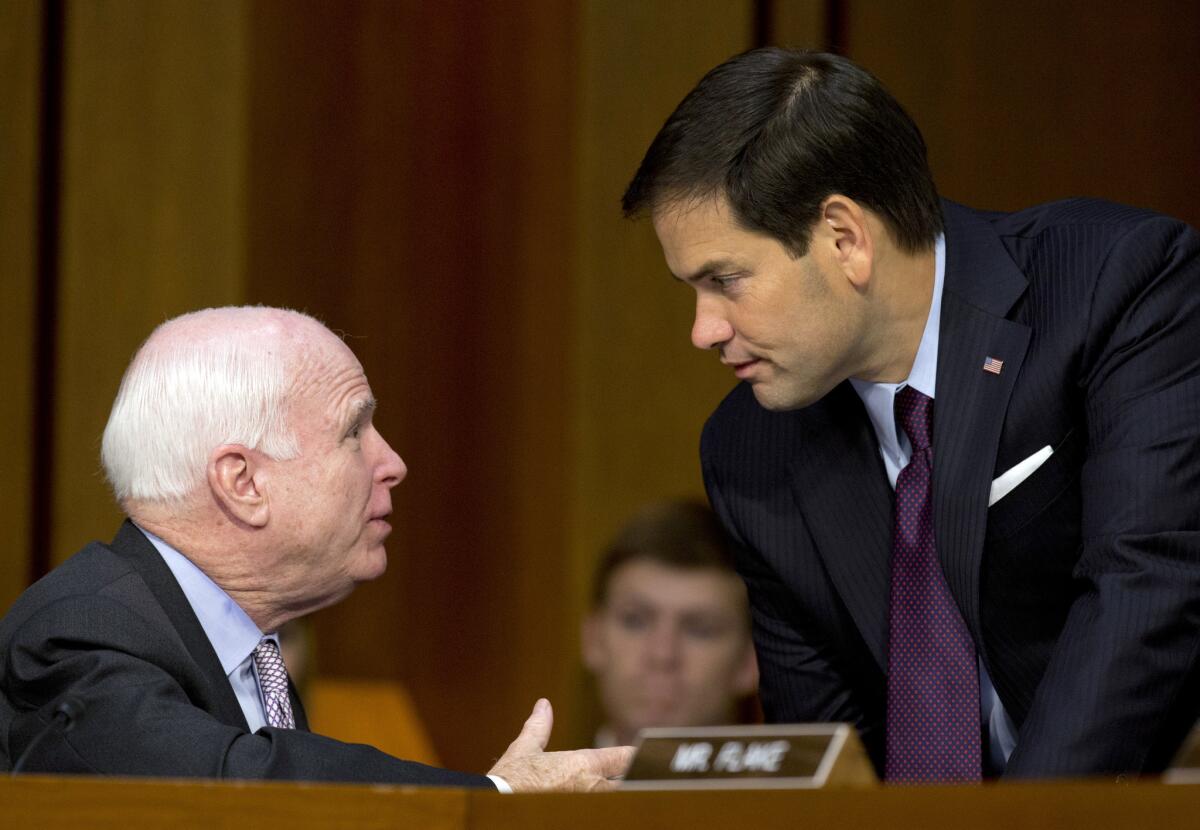Senate gives final passage to Obama’s plan for arming Syrian rebels

Reporting from Washington — The Senate gave final approval Thursday to President Obama’s plan to arm Syrian opposition groups in the fight against Islamic State militants, a vote that upended party allegiances and hardened opposition to the administration’s strategy.
Senators faced the same unease that House members did a day earlier, when the measure was also passed with bipartisan support and opposition. Lawmakers have questioned whether moderate Syrians could be trusted with American arms and worried the U.S. will become mired in another protracted Mideast battle.
The 78-22 vote, part of a broader package that included funding to keep the government running past September, gives the White House important, but temporary, support. Its expiration in December promises another debate once lawmakers return from the fall mid-term election.
“We are asked to decide things in this chamber that are in the best interest of our country, even if they did not work out the way we wanted,” said Sen. Marco Rubio (R-Fla.), a potential 2016 presidential contender, who supported the measure.
“If we do not confront and defeat ISIL now, we will have to do so later,” Rubio said, using another name for the terrorist group. “There is a guarantee of failure if we do not even try.”
Both Senate Majority Leader Harry Reid (D-Nev.) and the Republican minority leader, Sen. Mitch McConnell of Kentucky, backed the president, an unusual show of bipartisan support.
Obama welcomed the vote and praised lawmakers for moving quickly.
“I want to thank leaders in Congress for the speed and seriousness with which they approached this … issue, in keeping with the bipartisanship that is the hallmark of American foreign policy at its best,” Obama said.
But opposition was also mixed among senators, as Democrats running in tough re-election campaigns and Republicans with their eyes on the White House in 2016 peeled away. Nine Democrats, 12 Republicans and one Independent voted no.
“I disagree with my president,” said Sen. Mark Begich (D-Alaska), who opposed the package and is seeking reelection this fall. “What is our role in this endeavor?”
Among the 2016 hopefuls, Rubio parted ways with Sen. Rand Paul (R-Ky.) and Sen. Ted Cruz (R-Texas), who both voted no.
“It’s not that I’m against all intervention,” said Paul, who criticized the “insanity” of arming rebel forces. “Can you trust these people? It’s chaos over there. We will be sending arms into chaos.”
The White House’s request to authorize the Syrian effort, once considered a modest way to show congressional “buy-in,” ballooned into a broader debate on the administration’s approach to the Islamic State threat.
Many lawmakers from both parties now want a fuller debate on whether the administration has the authority it claims, from 2001 and 2002 war resolutions provided by Congress, to conduct airstrikes on militants in Iraq and Syria.
The promise from Democratic leaders that the Senate would hold that larger debate and vote during the lame-duck session helped bring some senators to support the president’s request.
“It did calm some concerns,” said Richard Durbin (D-Ill.), the assistant majority leader and a close Obama ally. “The notion that this president, or any president, can use that forever and ever, amen, is troubling.”
For the latest from Congress follow @LisaMascaroinDC
More to Read
Sign up for Essential California
The most important California stories and recommendations in your inbox every morning.
You may occasionally receive promotional content from the Los Angeles Times.











